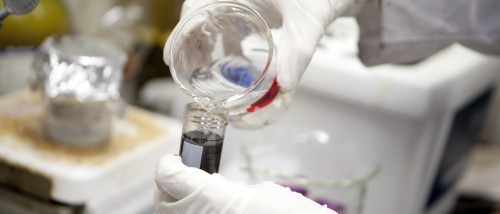
Chemical Engineering
Available Major

Available Major
The creation of alternative fuel sources is just one of many ways that chemical engineering provides critical solutions to the great challenges of our time. Chemical engineers develop the materials used in high-tech devices. They improve existing systems so that they are less environmentally destructive. They work in agriculture, pharmaceuticals, medicine, and a range of industrial and consumer fields.
The chemical engineering program at Tufts provides a solid foundation in engineering principles combined with hands-on laboratory experience. There are numerous opportunities to work in laboratories side-by-side with faculty and graduate students in more than a dozen research fields.
The nanocatalysis and advanced energy materials laboratories conduct research and experimentation on clean energy technologies. The pollution prevention projects laboratory gives undergraduates the opportunity to gain hands-on training in the manufacture of new catalysts for fuel production to generate hydrogen for fuel cell applications. The biotechnology, unit operations, and instrumentation laboratories all provide state-of-the-art resources to prepare Tufts undergraduates to move into the biological, environmental, health, legal, or medical fields. The degree prepares students to enter professional careers or continue with further academic study.
The BS in Chemical Engineering (BSCHE) is accredited by the Engineering Accreditation Commission of ABET, https://www.abet.org, under the General Criteria and the Program Criteria for Chemical, Biochemical, Biomolecular and Similarly Named Engineering Programs.
Sample Classes:
Photo credit: Kelvin Ma/Tufts University from Photoshelter
Tufts senior Sanya Ramjattan and Professor Matt Panzer show their research from the summer of 2011.
Chemical Engineering undergraduates offer a unique approach to providing access to clean water.